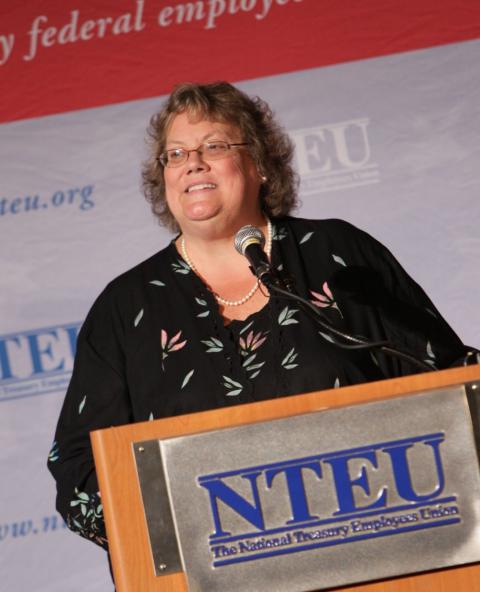Republican Plan to Eliminate IRS Union, As it Elects New Leadership, Could Threaten Federal Unions Generally
Republicans have an unwelcome gift for the retiring president of the National Treasury Employees Union (NTEU) and its newly elected officers.
A proposal by Senate Finance Committee Republicans would prohibit unions at the Internal Revenue Service. That would cut the labor organization’s membership in half.
If this attack is successful it would decimate NTEU and leave IRS staffers without union representation. More that than, it would weaken federal unions generally by making them all vulnerable to a similar assault.
The Republican plan was released last week, just days before NTEU President Colleen M. Kelley gave her farewell speech and Tuesday’s victory by Tony Reardon, NTEU’s current executive vice president, to succeed her. The proposal was in a GOP section of a bipartisan report on accusations of political interference at the IRS and fits with larger Republican efforts to restrict federal unions.
While the Republicans want to eliminate IRS union membership, their report provides no evidence that union members engaged in political favoritism involving tax-exempt organizations. In fact, Lois Lerner, the person at the center of that storm, was a manager and not eligible for union membership. The report does cite cases of individual IRS staffers violating the Hatch Act, which prohibits certain types of political actions by federal employees. That section of the report, however, does not mention NTEU or union membership.
In her final State of the Union speech Monday at the labor organization’s convention in Hollywood, Fla., Kelley said “the past few years will rank among some of the most difficult in the history of the federal workforce.” Kelley, who retires Thursday, recalled a number of NTEU victories during her tenure, among them organizing workers at several federal agencies, including a particularly tough campaign at the Securities and Exchange Commission.
[Read Colleen Kelley’s farewell speech]
“The SEC fought us tooth and nail,” she said. “They agreed to an election, then reneged. The FLRA (Federal Labor Relations Authority) ordered an election; SEC appealed. We held a very visible rally and, finally, an election, and of course, we won.”
Another big battle looms if the Republican proposal to ban unions from the IRS advances.
The plan, in the “Additional Republican Views” section of the Finance Committee report, takes aim at NTEU and Kelley.
“It is virtually impossible for the IRS to maintain the reality, much less the appearance, of neutrality and fairness to all taxpayers, when a substantial number of IRS employees are members of the highly partisan and left-leaning National Treasury Employees Union,” the GOP section says. The Republican views were previously reported by Government Executive.
The Republicans said the law “must be amended to designate the IRS as an agency that is exempt from labor organization and collective bargaining requirements.”
Their rationale is “the nature of their work requires them to be completely apolitical,” like employees in a handful of agencies, including the CIA, FBI and the Secret Service. Yet, law enforcement officers in the Border Patrol and Customs are unionized, as are correctional officers and airport transportation security officers. Furthermore, the requirement to provide services without political favoritism applies to federal employees generally, certainly in the executive and judicial branches. That’s the basis of the civil service.
About Kelley, the Republicans noted that she “is now both union president and an Obama administration appointee to the Federal Salary Council, whose function is to recommend raises for IRS and other federal employees. During the 2010 election cycle, when the IRS targeting of Tea Party groups began, the NTEU raised $613,633 through its political action committee (PAC), donating approximately 98 percent of that amount to Democrats. In 2012, $729,708 – or 94 percent of NTEU PAC contributions – went to anti-Tea Party Democrats.”
Kelley swung back, saying “No bipartisan report, including the bipartisan Senate Finance Committee report and reports by the Treasury Inspector General, has ever found any evidence of political motivation on the part of IRS employees.” NTEU is the second largest federal union with 85,000 members. More than half of them, 46,000 work at the IRS.
Democrats on the committee defended federal labor organizations, saying: “Union membership in and of itself does not mean political bias. The Additional Republican Views establish no factual evidence that any IRS employee, whether they belonged to a union or not, was politically biased in their actions related to the … applications with political advocacy issues.”
But in a statement to the Federal Diary, Finance Committee Chairman Orrin Hatch, who is not related to the Hatch of the Hatch Act, argued that “politicized environments make it easier for employees of any position to operate in an unfair manner.” Not allowing IRS employees to unionize, he added, “would minimize the risk for political influence and enhance the agency’s ability to operate without bias.”
That rationale can apply across the government. If Republicans are successful in denying employees union representation at the IRS, there would be no reason for them to stop there.
Maybe that’s the point.


Spread the word